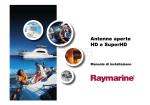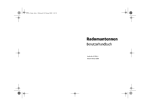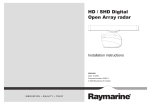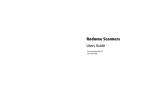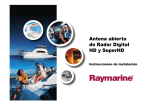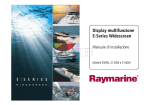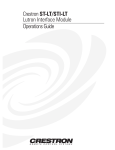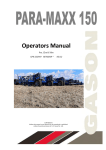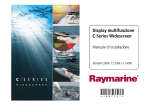Download Raymarine Radar Scanner User guide
Transcript
Digital Radome Scanner User Guide Document number: 81313-3 Date: February 2009 Trademarks and registered trademarks Autohelm, HSB, RayTech Navigator, Sail Pilot, SeaTalk and Sportpilot are UK registered trademarks of Raymarine UK Limited. Pathfinder and Raymarine are UK registered trademarks of Raymarine Holdings Limited. 45STV, 60STV, AST, Autoadapt, Auto GST, AutoSeastate, AutoTrim, Bidata, GSeries, HDFI, LifeTag, Marine Intelligence, Maxiview, On Board, Raychart, Raynav, Raypilot, RayTalk, Raystar, ST40, ST60+, Seaclutter, Smart Route, Tridata and Waypoint Navigation are trademarks of Raymarine UK Limited. All other product names mentioned are trademarks or registered trademarks (if applicable) of their respective companies. © Raymarine UK Ltd 2009 Contents i Contents Important information ................................................................1 Introduction........................................................................................... 1 Intended use ......................................................................................... 1 Safety notices ........................................................................................ 1 FCC Notice ............................................................................................ 2 WARNING ............................................................................................. 2 WARNING ............................................................................................. 2 Waste Electrical and Electronic Equipment Directive............................. 2 EMC conformance ................................................................................. 2 Declaration of conformity...................................................................... 2 Multi-function display software version ................................................ 3 Warranty ............................................................................................... 3 Handbook information .......................................................................... 3 Installation ....................................................................................5 EMC installation guidelines................................................................... 5 Box contents ......................................................................................... 6 Required tools ....................................................................................... 6 Digital Radome scanner dimensions...................................................... 7 18” Digital Radome scanner.............................................................. 7 24” Digital Radome scanner.............................................................. 7 Planning the installation ....................................................................... 8 Cable requirements ............................................................................... 9 Scanner cables................................................................................... 9 Running the cable to the scanner ...................................................... 9 Power requirements......................................................................... 10 Grounding the radar system ............................................................ 10 Connecting the power and digital cables......................................... 11 Mounting the scanner ..................................................................... 14 Setting up the scanner ..................................................................... 15 Maintenance and troubleshooting .......................................... 17 Introduction ..................................................................................... 17 Maintenance.................................................................................... 17 Troubleshooting............................................................................... 17 Technical support............................................................................. 19 Technical specification.............................................................. 21 RD418D 18”Digital Radome scanner unit .......................................... 21 RD424D 24”Digital Radome scanner unit .......................................... 23 ii Digital Radome Scanner - User Guide Important information 1 Important information Introduction Safety notices This handbook contains an explanation of how to install, connect and maintain your Digital Radome scanner and covers the following models: • RD418D - 18” 4 kW Digital Radome scanner. • RD424D - 24” 4 kW Digital Radome scanner. Your radar has been designed and manufactured to meet the rigorous demands of the marine environment. However, no machine can perform its intended function unless installed, operated and maintained properly. Please carefully read and follow the recommended procedures for installation contained in this handbook. When properly installed and operated, the use of this radar conforms to: • • IEEE C95.1 - 2005 - Standard for Safety Levels with respect to Human Exposure to Radio Frequency Electromagnetic Fields, 3 kHz to 300GHz. ICNIRP Guidelines 1998 - International Commission on Non-Ionising Radiation Protection: Guidelines for limiting exposure to time-varying electric, magnetic and electro-magnetic fields (up to 300GHz) 1998. WARNING Radio Frequency Radiation Hazard The radar antenna emits electromagnetic energy at microwave radio frequencies which can be harmful, particularly to your eyes. DO NOT look at the antenna at close range. It is important that the radar is turned off whenever personnel are required to come close to the scanner assembly. It is recommended that the radar scanner is mounted out of range of personnel (above head height). The maximum power density level which is considered safe for general public exposure is 10 W/m2, and for occupational exposure it is 100 W/m2. The distances from the radar scanner within which these levels may be exceeded are given below: Intended use Model This product is a radar scanner intended for use within a navigational radar system. The intended application is for leisure marine boats and work boats not covered by IMO/SOLAS carriage requirements. RD418D Installation and operation of this radar may be subject to individual licensing of the equipment, operator or vessel. You are strongly advised to check with the requirements of the licensing authority of your national administration. In case of difficulty, contact your local Raymarine dealer. RD424D Distance to 100 W/m2 point Max power density at any distance is <100 W/m2 Max power density at any distance is <100 W/m2 Distance to 10 W/m2 point 1.0m (worst case) 1.0m (worst case) 2 Digital Radome Scanner - User Guide WARNING High Voltage The scanner unit contains high voltages. Adjustments require specialized service procedures and tools only available to qualified service technicians - there are no user serviceable parts or adjustments. The operator should never remove the scanner unit internal covers or attempt to service the equipment. WARNING Product installation This equipment must be installed in accordance with the instructions contained in this handbook. Failure to do so could result in poor product performance, personal injury and/or damage to your boat. Waste Electrical and Electronic Equipment Directive The Waste Electrical and Electronic Equipment (WEEE) Directive requires the recycling of waste electrical and electronic equipment. Whilst the WEEE Directive does not apply to some of Raymarine’s products, we support its policy and ask you to be aware of how to dispose of this product. The crossed out wheelie bin symbol, illustrated above, and found on our products signifies that this product should not be disposed of in general waste or landfill. Please contact your local dealer, national distributor or Raymarine Technical Services for information on product disposal. EMC conformance All Raymarine equipment and accessories are designed to the best industry standards for use in the recreational marine environment. The design and manufacture of Raymarine equipment and accessories conform to the appropriate Electromagnetic Compatibility (EMC) standards, but correct installation is required to ensure that performance is not compromised. FCC Notice Declaration of conformity Changes or modifications to this equipment, not expressly approved in writing by Raymarine Inc., could violate compliance with FCC rules and void the operator’s authority to operate the equipment. Raymarine UK Limited hereby declare that the products to which this manual relates comply with the appropriate requirements and provisions of the R&TTE Directive 1999/5/EC. The full Declaration of Conformity may be viewed on the relevant product pages at www.raymarine.com Important information 3 Multi-function display software version Handbook information The Digital Radome scanner can be connected directly to a C-Series or E-Series display, or to a C-Series, E-Series or G-Series display via a SeaTalkhs switch. The technical and graphical information contained in this handbook, to the best of our knowledge, was correct as it went to press. However, our policy of continuous improvement and updating may change product specifications without prior notice. As a result, unavoidable differences between the product and handbook may occur from time to time. The Digital Radome scanner is compatible with the following multi-function displays: • C90W, C120W, and C140W C-Series displays. • E80, E120 E-Series displays. • G120, G150, G170, and G190 G-Series displays. For operation of your scanner, the multi-function display unit requires the latest software version. After installing your scanner, download the latest software for your multifunction display from the Raymarine website (www.raymarine.com). To find out whether your display is using the latest software version, switch on the display and check the version number on the navigation warning screen. However, if a scanner is not connected to the multi-function display, the version number will only be displayed for 10 seconds. For information on how to update your multi-function display software, please refer to the instructions on the Raymarine website, or contact Raymarine technical support. Warranty To register your new Raymarine product, please take a few minutes to fill out the warranty card. It is important that you complete the owner information and return the card to receive full warranty benefits. Alternatively you can register your product on line at www.raymarine.com 4 Digital Radome Scanner - User Guide Installation 5 Installation EMC installation guidelines All Raymarine equipment and accessories are designed to the best industry standards for use in the recreational marine environment. Their design and manufacture conforms to the appropriate Electromagnetic Compatibility (EMC) standards, but correct installation is required to ensure that performance is not compromised. Although every effort has been taken to ensure that they will perform under all conditions, it is important to understand what facts could affect the operation of the product. The guidelines here describe the conditions for optimum EMC performance, but it is recognized that it may not be possible to meet all of these conditions in all situations. To ensure the best possible conditions for EMC performance within the constraints imposed by any location, always ensure the maximum separation possible between different items of electrical equipment. For optimum EMC performance, it is recommended wherever possible: • • Raymarine equipment and cables connected to it are: • At least 3 ft. (1m) from any other equipment transmitting or carrying radio signals. In the case of Single Side Band (SSB) radio, the distance should be increased to 7 ft. (2m). • More than 7 ft. (2m) from the path of a radar beam. A radar beam can normally be assumed to spread 20 degrees above and below the radiating element. The equipment is supplied from a separate battery to that used for engine start. Voltage drops below 10.8 V, and starter motor transients, can cause the equipment to reset. This will not damage the equipment, but may cause the loss of some information and may change the operating mode. • Only Raymarine-specified cables must be used. Cutting and rejoining these cables can compromise EMC performance. 6 Digital Radome Scanner - User Guide Box contents Required tools 10 mm drill bit 27.5 mm Center Line of Radome Radome Scanner Spring washer (x4) Flat washer (x4) Adhesive tape Center Line of Radome 141.5 mm M8 bolt (x4) Drill Drill 4 holes, 10 mm diameter (18'' and 24'' Radomes) 233 mm 13 mm socket Forward Torque wrench D11365-1 18'' or 24'' Radome Mounting Template 3026-136-C Artwork Number 3032-866-B Denso Paste Installation template D11364-2 Components are dependant on your system package, but are either: • • • • • 18” 4 kW Digital Radome scanner, or 24” 4 kW Digital Radome scanner. Fixing bolts and washers. Denso Paste. Handbook. Installation 7 Digital Radome scanner dimensions 247 mm (9.7 in) 24” Digital Radome scanner 247 mm (9.7 in) 18” Digital Radome scanner 346 mm (13.62 in) diameter 346 mm (13.62 in) diameter 27.5 mm (0.92 in) 233 mm (9.17 in) 116.5 mm (4.58 in) 652 mm (25.67 in) diameter 233 mm (9.17 in) 116.5 mm (4.58 in) 521 mm (20.5 in) diameter 27.5 mm (1.08 in) 141.5 mm (5.57 in) 141.5 mm (5.57 in) D11356-1 D11357-1 8 Digital Radome Scanner - User Guide Planning the installation 12.5° 12.5° D11359-1 Mount the scanner so that the array rotates parallel to the waterline. The radar beam is approximately 25o wide in the vertical direction, giving good target detection when your boat pitches and rolls. D11358-1 Mount the scanner as high as possible above the waterline for better long range performance, but make sure it: • • • • • is above head height. is easily accessible. is as near to the boat’s centerline as possible. is on a rigid and stable platform. is clear of large objects such as the flybridge, large engine stacks, searchlights, horns or masts. • is clear of heat and fumes. • is at least 1 m away from a magnetic compass or other equipment antenna. Don’t put the scanner so high, that it is affected by the pitching and rolling of the boat. Forward Wedge or washers D11360-1 Planing hull and some displacement hull boats adopt a higher bow angle when the boat is at cruising speed, giving poor target detection. It may be necessary to lower the radar beam back towards the parallel, by shimming the rear of the radar, so that the beam points slightly down when the boat is at rest. Refer to the diagram on page 14 for more information. Installation 9 Cable requirements Digital cable You must consider the following points before installing the system cables: A digital cable, illustrated below, is required. This provides both power and SeaTalkhs signals to the Digital Radome scanner. It is fitted with a SeaTalkhs plug, and power cores for connecting to the scanner. • • • • • You need to connect the scanner to the multi-function display unit and power (and, if appropriate, via a SeaTalkhs switch). All cables should be adequately clamped and protected from physical damage and exposure to heat - avoid running cables through bilges or doorways, or close to moving or hot objects. Acute bends must be avoided. The digital cable for connecting the Digital Radome scanner to a multi-function display and power source has a minimum bend radius of 45mm (or diameter of 90mm). Where a cable passes through an exposed bulkhead or deckhead, a watertight gland or swan neck tube should be used. Avoid cutting and rejoining cables. Scanner cables Running the cable to the scanner DO NOT pull the cable through bulkheads using a cord attached to the connector. This could damage connections. The cable connector is at the rear of the scanner unit. If the unit is mounted on a hollow mast, the cable may be run inside the mast and connected to the unit. Make sure that the cable does not chafe where it enters and exits the mast. To minimize electrical interference try to avoid running radar cables near other onboard electrical equipment. It is also good practice to avoid running radar cables in parallel with other antenna or power cables. To Digital Radome scanner To display and power D11371_1 Digital cables are available in the following lengths: • Part No. A55076 - 5 m cable. • Part No. A55077 - 10 m cable. • Part No. A55078 - 15 m cable. • Part No. A55079 - 25 m cable. The following extension cables are also available: • Part No. A92141 - 2.5 m extension cable. • Part No. A55080 - 5 m extension cable. • Part No. A55081 - 10 m extension cable. For boats with 12 V DC power systems, the maximum cable length is 25 m (including any extension). If you need to run a longer cable length with a 12v supply, please contact Raymarine technical support for further advice. Note: Do not make your own cables for use with the Digital Radome scanner. Only use official Raymarine cables. 10 Digital Radome Scanner - User Guide Power cables Digital Radome radar systems are intended for use on boat’s DC power systems operating in the range 12 to 24 V DC. The Digital Radome scanners should not be used on nominal 32 V systems. If you are replacing an existing (Analog) Radome scanner with a Digital Radome scanner, you must replace the existing cable with a digital cable, as described on page 9. tion panel), you must fit an inline breaker or fuse to the positive (red) connection of the power cable. Table 2-1: Fuse requirements Power supply Device Rating 12 V Isolator Switch 20 A Thermal Breaker 10 A Fuse 15 A Isolator Switch 15 A Thermal Breaker 5A Fuse 8A Power requirements This radar is NOT recommended for use on ‘positive’ ground boats. The power cable earth screen must be connected to the boat’s ground. The boat’s power system should be either: • Negative grounded, with the negative battery terminal connected to the boat’s ground, or, • Floating with neither battery terminal connected to the boat’s ground. The following diagram shows the cable’s power and ground connections: Red - Battery +ve (12/24 V) Black - Battery -ve (0 V) D8865_1 Ground Fuse requirements The power connection to the Digital Radome scanner should be made at either the output of the battery isolator switch, or at a DC power distribution panel. The power connection must be protected by a thermal circuit breaker or fuse, fitted close to the power source. The following table details the fuse requirements for both 18” and 24” Digital Radomes: WARNING: If there is not a thermal circuit breaker or fuse in your power circuit (for example, fitted to your DC distribu- 24 V Grounding the radar system It is important that an effective radio frequency (RF) ground is connected to the radar system. You must ground the radar by connecting the drain wire (screen) of the power cable to the nearest ground point of your boat’s RF ground system. Full details can be found in the Owner’s Handbook for your multi-function display unit. If you need to extend the wire, the extension wire should be an 8 mm braid or 6 mm2 (AWG 10) multi-strand cable. If your vessel does not have an RF system, connect the drain wire to the negative battery terminal. Note: Use only this ground connection. Installation Connecting the power and digital cables 11 Digital Radome connected directly to C-Series display The following must be observed: • The threads of the Digital Radome digital cable external connector should be lightly greased with “Renolit Aqua 2 Calcium” grease if disconnected after the initial installation. • Preferred connection of the power cable is directly to your boat’s power distribution panel. • Care should be taken to ensure a firm connection between the Digital Radome’s external connector and the digital cable connector. • The digital cable connection to the Digital Radome scanner must be hand-tightened only. The following diagrams show the various configurations in which the Digital Radome scanner may be connected to your multi-function display: Radar C-Series display SeaTalkhs Crossover Coupler 12/24V power D11372-1 Note: you must use a SeaTalkhs Crossover Coupler for direct connections. 12 Digital Radome Scanner - User Guide Digital Radome connected to networked E-Series Radar SeaTalkhs Switch SeaTalkhs SeaTalkhs 12/24V power D11391-1 Installation 13 Digital Radome connected to G-Series display Radar Monitor Network selector switch (in UP position) GPM 400 SeaTalkhs Switch SeaTalkhs SeaTalkhs 12/24V power D11373-1 14 Digital Radome Scanner - User Guide Mounting the scanner Preparing the mounting holes 36 -A -A 66 -8 32 r 30 be Num 1 30 k or Artw 26 -1 Mounting platform pla m Te g in nt e om Ce ad 'R 4' ' 18 Ce ' 2 or in rL nte ll 4 n Dri ' a 8 (1 ete m dia m ) m es 10 om s, ad le ' R ho 24 d r e 23 3 of m m Ra do m nte e rL in e of ou M Ra do m e d ar rw Fo te D AR RW FO m 5m 27.5 FORWARD 141. mm Mounting platform, non-planing boat (level install) 2 2 Mounting platform, planing boat (typical planing angle shown) 1. Tape template to mounting platform. 2. Using template, drill 10 mm diameter hole in 4 positions. FORWARD D11361-1 IMPORTANT Ensure mounting platform is adequately robust for this installation. D11362-1 1 Installation 15 Securing the scanner to the mounting platform To prevent damage to the base of the Digital Radome scanner, you must not insert more than 25mm (1 inch) of each bolt in to the base of the scanner, as shown in the following diagram: Mounting platform 25 mm (1.0 inch) maximum D11368-1 Setting up the scanner Before you go to sea It is important to check the installation before you go to sea. This involves aligning the scanner and checking the system timing, using your multifunction display. Note: The M8 bolts that secure the Digital Radome scanner to the mounting platform require a torque of 20Nm (177lbf.in). Use the supplied "Denso Paste" to lightly coat the mounting bolts. EMC conformance check D11363-1 F O R W A R D These checks are described in the following sections. Always check the installation before going to sea to make sure that it is not affected by radio transmissions, engine starting, etc. 16 System checks System check Before performing any functional tests, make sure: • All securing bolts are fully tightened and mechanical locking washers as specified are in place. • All connections have been made. • All connecting wires are secured and protected as necessary. If you have installed the radar yourself, ask your local Raymarine authorized installation dealer to check the installation. Set up, alignment and timing checks Switch on and initial set up 1. Press and hold the POWER key of your multi-function display unit until the unit beeps. The magnetron warm-up sequence should start, after which the unit should enter standby mode. 2. Power on the Digital Radome scanner, using the relevant softkey on your multi-function display. 3. If necessary, adjust the brightness on your multi-function display unit. 4. If necessary, change the default language settings. Transmission check Ensure that all personnel are clear of the scanner and switch to transmit mode. Run through the radar operations as described in the relevant multifunction display unit’s Owner’s Handbook and check that all the expected data is displayed. Bearing alignment With the system correctly installed, check the bearing alignment to ensure that targets appear at their correct bearing relative to the boat’s bow. Adjust the alignment as necessary. Digital Radome Scanner - User Guide Display timing adjustment It is advisable to check the display timing before using the system for navigation. For instructions on how to do this, refer to the installation guide for your multi-function display. Maintenance and troubleshooting 17 Maintenance and troubleshooting CAUTION: System power Always turn the radar system OFF before carrying out any routine maintenance on the scanner or nearby equipment. Introduction Problem Possible causes and solution “No Data” or “No Scanner” message 1. Check that the cable connecting the Digital Radome scanner to the multifunction display unit is firmly attached and undamaged. 2. Check relevant scanner fuses and breakers. 3. Check that the power source is of the correct voltage and sufficient current. 4. Software mismatch between equipment may prevent communication. Contact Raymarine technical support. If using a SeaTalkhs Switch: 5. Check that all radar scanners are correctly connected to the SeaTalkhs switch. 6. Check the status of the SeaTalkhs switch. 7. Check that SeaTalkhs cables are free from damage. The bearing displayed on the multi-function display is not the same as the actual bearing. Perform the bearing alignment procedure described in the installation guide for the relevant multi-function display unit. DO NOT remove the rear cover of the multi-function display or the external cover of the Digital Radome scanner. There are no user serviceable parts or adjustments. DO NOT attempt to service the equipment. Maintenance Maintenance is limited to the following periodical checks: • • • • Examine the cables for signs of damage, such as chafing, nicks and cuts. If the connector is showing signs of corrosion, lightly grease the threads of the connector with “Renolit Aqua 2 Calcium” grease. Check that the cable connectors are firmly attached. Make sure the scanner is still securely attached to the mounting surface. Once a year, remove, grease and re-attach the mounting bolts securing the scanner. Troubleshooting The following table will help you identify the most likely cause of a problem, and the corrective action required to restore normal operation. 18 If you still have a problem after referring to this table, contact your local dealer, national distributor or Raymarine technical support for further advice. Always quote the product serial number. The multi-function display unit serial number can be found on the back of the unit, the scanner serial number can be found on the back of the scanner near the connector. Digital Radome Scanner - User Guide Maintenance and troubleshooting Technical support Raymarine provides a comprehensive customer support service, on the world wide web, through our worldwide dealer network, and by telephone help line. If you are unable to resolve a problem, please use any of these facilities to obtain additional help. Web support Please visit the customer support area of our website at www.raymarine.com This contains Frequently Asked Questions, servicing information, e-mail access to the Raymarine Technical Support Department and details of worldwide Raymarine agents. Telephone support In the USA call:+1 603 881 5200 extension 2444 In the UK, Europe, the Middle East, or Far East call:+44 (0)23 9271 4713 Product information If you require technical support, please have the following information to hand: • Product name. • Product identity. • Serial number. • Software application version. You can obtain this product information using the menus within your product. 19 20 Digital Radome Scanner - User Guide 21 Appendix A: Technical specification RD418D 18”Digital Radome scanner unit General Approvals CE - conforms to 1999/5/EC FCC - conforms to 47CFR Part 2 and Part 80 Industry Canada - conforms to RSS138 Transmitter Transmitter Frequency 9405 ± 25 MHz Peak Power Output 4.0 kW (nominal) Transmitter Solid-state modulator driving Magnetron Dimensions Φ521 x 247 mm (20.5 x 9.7 in) Weight 9.5 kg (21 lbs) Input Voltage 12 - 24 V DC (from multi-function display unit) 0.125, 0.25 N/A 75 ± 10ns 3.0 0.50, 0.75 0.125, 0.25 100 ± 10ns 3.0 40 W (20 W Standby) N/A 0.5, 0.75 150 ± 10ns 3.0 Waterproof to IPX 6 Temperature range: -10° to +55°C Humidity limit: up to 95% at 35°C Maximum wind speed for satisfactory operation: 100 Kts 1.5 N/A 250 ± 5% 3.0 3 1.5 350 ± 5% 2.0 N/A 3.0 450 ± 5% 1.5 N/A N/A 600 ± 5% 1.3 48 Nautical miles (Nm) 6.0 6.0 1.0 μs ± 5% 740 Hz Power Consumption Environmental Maximum Range Scale Range (Nm) Expanded Range (Nm) Pulse Width (ns) PRF (kHz) Standby Mode magnetron heater and control left on, all other services off Duplexer Circulator 22 Digital Radome Scanner - User Guide Antenna Antenna Type Patch array Beam Width (nominal) 4.9° horizontal, 25° vertical Polarization Horizontal Rotation Rate 24 rpm (nominal) Receiver IF Frequency 60 MHz (nominal) Receiver Characteristic Logarithmic Receiver Noise Figure Less than 5 dB (including Low Noise Converter/Limiter & IF Receiver) Receiver Bandwidth 12/3/0.7/0.5 MHz 23 RD424D 24”Digital Radome scanner unit General Approvals CE - conforms to 1999/5/EC FCC - conforms to 47CFR Part 2 and Part 80 Industry Canada - conforms to RSS138 Transmitter Transmitter Frequency 9405 ± 25 MHz Peak Power Output 4.0 kW (nominal) Transmitter Solid-state modulator driving Magnetron Dimensions Φ652 x 247 mm (25.67 x 9.7 in) Weight 10.0 kg (22 lbs) Input Voltage 12 - 24 V DC (from multi-function display unit) 0.125, 0.25 N/A 75 ± 10ns 3.0 0.50, 0.75 0.125, 0.25 100 ± 10ns 3.0 40 W (20 W Standby) N/A 0.5, 0.75 150 ± 10ns 3.0 Waterproof to IPX 6 Temperature range: -10° to +55°C Humidity limit: up to 95% at 35°C Maximum wind speed for satisfactory operation: 100 Kts 1.5 N/A 250 ± 5% 3.0 3 1.5 350 ± 5% 2.0 N/A 3.0 450 ± 5% 1.5 N/A N/A 600 ± 5% 1.3 48 Nautical miles (Nm) 6.0 6.0 1.0 μs ± 5% 740 Hz Power Consumption Environmental Maximum Range Scale Range (Nm) Expanded Range (Nm) Pulse Width (ns) PRF (kHz) Standby Mode magnetron heater and control left on, all other services off Duplexer Circulator 24 Digital Radome Scanner - User Guide Antenna Antenna Type Patch array Beam Width (nominal) 3.9° horizontal, 25° vertical Polarization Horizontal Rotation Rate 24 rpm (nominal) Receiver IF Frequency 60 MHz (nominal) Receiver Characteristic Logarithmic Receiver Noise Figure Less than 5 dB (including Low Noise Converter/Limiter & IF Receiver) Receiver Bandwidth 12/3/0.7/0.5 MHz www.raymarine.com 0168 !































